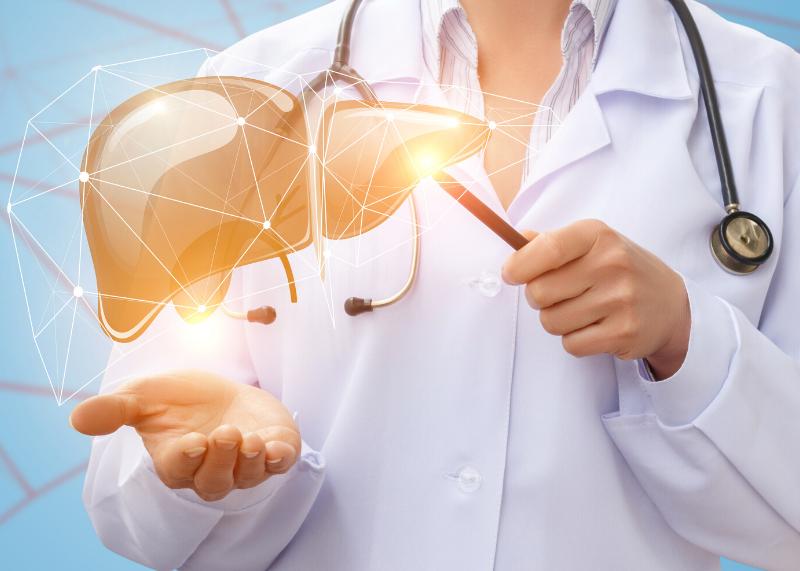Sameer, businessman went to the clinic of Dr Vikram Raut with pain in abdomen (Fatty Liver). After evaluation he is found to have fatty liver. Due to Covid-19 lockdown since March; Sameer’s business has halted, which led to economic stress. He had weight gain of 5 kgs over last 6 months. Stress of economic loss, overeating, lack of physical activity all contributed to development of fatty liver.
Fatty liver is reversible disease, it is early warning sign of many sever health conditions like liver cirrhosis and it is also associated with non-communicable diseases like diabetes, hypertension, ischemic heart disease. The epidemic of non-communicable diseases is further worsened with COVID-19 Pandemic.
Epidemic of non-communicable diseases
Every year, non communicable diseases kill about 40 million people, that account for around 70% of all deaths globally. The main non communicable diseases are cardiovascular diseases, stroke, diabetes and chronic respiratory diseases. Majority of non-communicable diseases are associated with behavioural risk factors like tobacco use, unhealthy diet, insufficient physical activity and harmful use of alcohol and hence, are also known as lifestyle diseases. India was slated for an economic loss of more than $236 million in 2015 due to non-communicable diseases.
The risk factors for non-communicable diseases explained by Dr. Vikram Raut
- Modifiable behavioural risk factors: Behavioural risk factors such as excessive use of alcohol, bad food habits, eating and smoking tobacco, physical inactivity, wrong body posture and disturbed biological clock increase the likelihood of Non communicable diseases. Desk jobs and the stress related to work is also being seen as a potential risk factor for non-communicable diseases.
- Non-modifiable risk factors: risk factors like age, race, gender, genetics which cannot be modified.
- Metabolic risk factors: Increased blood pressure, obesity, increased blood glucose levels, increased levels of fat in the blood (hyperlipidaemia) are associated with increased incidence of Non communicable diseases.
Covid-19 worsened epidemic of non-communicable diseases
COVID-19 is a global burden which continues to redefine daily lifestyle-related habits in a significant manner. Public health recommendations and government measures taken to abate infection have indirectly impacted food availability, dietary quality, normal daily activities, access to recreational public settings, social activities, work and financial security. These factors compound over time to radically change lifestyle-related behaviours, especially daily eating, activity and sleep behaviours that are known to be independent risk factors for metabolic complications such as obesity, diabetes and cardiovascular disorders.
Impact of COVID lockdown on the eating habits and physical activity behaviour.
- Studies suggest that confinement increased intake of high fat salt sugar (HFSS) food items due to eating out of anxiety or boredom, a dip in motivation to maintain healthy eating or an increase in mood-driven eating.
- Significant reduction in moderate intensity aerobic exercises as well as leisure related activities coupled with an increase in daily screen and sitting time.
- It is evident that government recommendations to limit outside movement and restrictions on social gathering (group sports and walking or exercise classes), availability (sports and gym facilities) and accessibility (public recreational spaces such as community centres, parks and sports grounds) is linked to decrease in active participation in exercise and normal leisure related activity such as walking, grocery shopping and gardening etc.
- Quarantine induced stress and anxiety due to various events like fear of getting infected by coronavirus, boredom, loneliness and financial loss at work, news of lockdown extensions, travel restriction.
- COVID-19 has limited day-to-day social engagements such as workplace interactions, participation in recreational activities, socializing and eating out which might lead to an increase in mental health distress.
Health goals amid of COVID pandemic
- Get adequate rest daily
- People with the best health and longevity get at least 7 to 8 hours of sleep daily.
- Taking time for daily relaxation and recreation is also helpful to the body and mind.
- Get regular physical activity
- Aim for 30-60 minutes of physical activity on most, preferably all days of the week
- Include strengthening exercise 2+ times per week to maintain a healthy lean body weight
- Eat more plant-based foods
- Aim for at least 5 (up to 9 is recommended) servings of fruits and vegetables daily.
- Limit fatty meats and high cholesterol foods.
- Peas, beans, nuts, and soy foods are good sources of plant proteins.
- Eat more whole-grain breads and cereals
- Aim for at least 3 servings of whole-grains daily.
- Limit highly refined cereals such as white bread, pastry, white rice, and sugary cereals.
- Choose healthy fats
- Choose un-hydrogenated vegetable oils and trans-fat free margarine in place of animal and solid fats such as butter, hard stick margarine, and shortening.
- Eat at least 1 serving of nuts daily (1 oz of nuts or 2 tablespoons of peanut or almond butter).
- Eat foods high in n-3 fatty acids daily such as flax meal, walnuts, soy, or canola and soy oils.
- Achieve/Maintain a healthy weight
- A BMI less than 25 is ideal. A BMI of 30 or above indicates obesity and high risk.
- A waist girth less than 37 inches for men and less than 32 inches for women is ideal.
- A waist girth of 40+ inches indicate high risk for men and 35+ inches are high risk for women.
- Be free of dependence on tobacco, or alcohol
About Dr Vikram Raut
Dr Vikram Raut is senior consultant hepatobiliary and lead liver transplantation surgeon. He has extensive experience of Living-donor liver transplantation, with cumulative experience of over 1200 liver transplants and performed >500 Living liver donor surgery. Dr. Vikram is trained in Liver Transplantation and HPB surgery with pioneers in liver transplants in Japan, France, and South Korea. He was awarded “International Travel Scholar Award 2010” given by International Liver transplantation society. To make liver transplantation accessible, Dr Vikram Raut’s team invented public-private philanthropic model for financial assistance to children with liver disease. Funds for transplant were raised through help of charitable trusts and crowd funding. Dr Vikram Raut is experienced liver transplant surgeon heading most successful liver transplant program in western India. His expertise includes liver resection and transplantation for liver cancers, split liver transplantation, ABO incompatible liver transplantation.
Website- https://www.livertransplantssurgeon.com
Email- drvikramraut@gmail.com
Whatssapp- +919717657178
Views: 1

